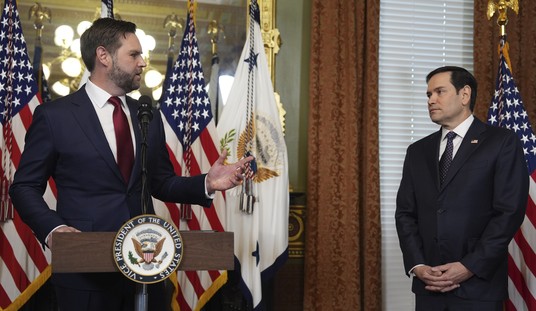You do now, thanks to the Gray Lady’s predilection for disclosing national-security secrets across its pages. The NYT opens a discussion on John Brennan’s work in the drone program, pushed to the forefront because of his pending confirmation hearing for CIA Director by the Senate Intelligence committee, and a leaked memo describing the rather ambiguous process of deciding whether to use drone strikes on American citizens abroad suspected of terrorist activities. Among Brennan’s accomplishments are the agreement with Saudi Arabia to use their country as a base for drone attacks on radical Islamist terrorists:
Mr. Brennan, a former C.I.A. station chief in Riyadh, Saudi Arabia, has taken a particular interest in Yemen, sounding early alarms within the administration about the threat developing there, working closely with neighboring Saudi Arabia to gain approval for a secret C.I.A. drone base there that is used for American strikes, and making the impoverished desert nation a test case for American counterterrorism strategy.
In recent years, both C.I.A. and Pentagon counterterrorism officials have pressed for greater freedom to attack suspected militants, and colleagues say Mr. Brennan has often been a restraining voice. The strikes have killed a number of operatives of Al Qaeda in the Arabian Peninsula, the terrorist network’s affiliate in Yemen, including Said Ali al-Shihri, a deputy leader of the group, and the American-born cleric Anwar al-Awlaki.
But they have also claimed civilians like Mr. Jaber and have raised troubling questions that apply to Pakistan and Somalia as well: Could the targeted killing campaign be creating more militants in Yemen than it is killing? And is it in America’s long-term interest to be waging war against a self-renewing insurgency inside a country about which Washington has at best a hazy understanding?
And is it a good idea to disclose our operations inside such a country on the front page of a newspaper? When one reads the story, the base location is actually superfluous to the point. The NYT argues that the drone strikes are the big problem, not the base. So why reveal its location and put pressure on Saudi Arabia to explain its cooperation in these attacks from what Muslims consider holy ground? Remember that one of the reasons that radicals attacked the US was the staging of American armed forces in Saudi Arabia starting in 1990 for Operation Desert Shield after Saddam Hussein invaded Kuwait.
The drone strike memo is getting pretty bad reviews across the political spectrum today, too. The New Republic’s Jeffrey Rosen calls it unconstitutional, and ignorant of long legal precedent:
The Justice Department white paper released on Monday by NBC News is the public’s first direct glimpse at the legal reasoning that the Obama administration relied on in using a drone strike to kill Anwar al-Awlaki, a U.S. citizen living in Yemen. The memo’s arguments are troubling on many levels. Although the Obama administration’s brief is directed at the assassination of Americans abroad, the arguments it offers could apply with equal force to the assassination of Americans at home; lawyers for the Bush administration who tried to justify lesser outrages have been pilloried for supporting torture. …
This “trust us” argument is precisely the one the Supreme Court rejected in the 2004 Hamdi, where the Court upheld the Bush administration’s power to detain enemy combatants, on the grounds that it had been authorized by Congress, but only after insisting that suspects could challenge the factual basis for their detention before a neutral decision maker. The Obama administration repeatedly invokes the Hamdi case to justify targeted assassinations, which have been specifically prohibited by Congress, and then omits the Supreme Court’s requirement that independent judges need to have the last word on whether or not suspects are, in fact, as dangerous as the administration claims. …
There are other reasons to object to the administration’s justification of targeted assassinations—including its questionable claim that they are legally supported by Congress’s authorization of the use of force after 9/11. On pragmatic grounds, the administration’s brief is a disaster: As the Church Commission found after studying the attempted assassinations of Castro, targeted killings are likely to produce an international backlash that threatens far more American lives than they protect. But, as a legal matter, the casual, and unpersuasive, attempt to read out of American constitutional law the principle that government can only kill citizens in order to prevent imminent death or violence in return is the most objectionable of all.
Matt Lewis suggests that the Obama administration may just be giving us what we want — while we remain ignorant of the implications. In fact, ignorance is the selling feature:
American citizens want someone who will make the big, bad world disappear. Problems only exist if we have to confront them. Obama has made warfare more convenient for us — and less emotionally taxing. We should thank him.
This dynamic helps explain why some other liberal policies become popular. Ignorance is bliss. It’s why many people believe that adults have more rights than the unborn (after all, we can see them, hear them complain. Likewise, an unborn baby cannot talk. The unborn can’t hire a lobby.) The same could be said about spending. The notion of debt surpassing trillions of dollars is so ethereal as to be incomprehensible. See no evil, hear no evil…
And so, we appreciate Obama. With Bush, we had to see pictures of inmates. Yes, it’s possible that some of the information extracted might have led us to bin Laden — but it still makes us feel bad. And we had to hear about waterboarding. How barbaric! It is far better to simply cause your enemies to evaporate. It’s like pulling a band-aid off all at once. It’s so much tidier — so much more sophisticated.
Dead men tell no tales.
For the last word, let’s turn to Michael Ramirez. The Pulitzer-winning editorial cartoonist captures the essence of what Rosen and Lewis argue today:
Also, be sure to check out Ramirez’ terrific collection of his works: Everyone Has the Right to My Opinion, which covers the entire breadth of Ramirez’ career, and it gives fascinating look at political history. Read my review here, and watch my interviews with Ramirez here and here. And don’t forget to check out the entire Investors.com site, which has now incorporated all of the former IBD Editorials, while individual investors still exist.









Join the conversation as a VIP Member